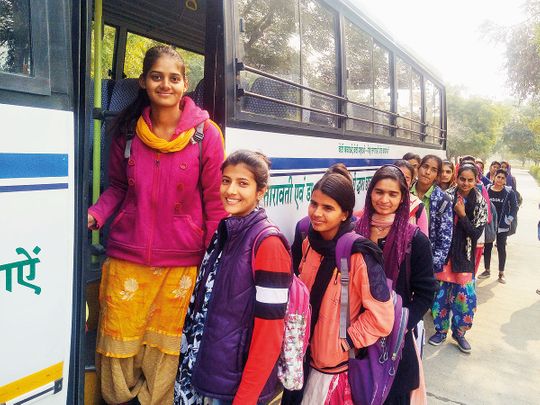
New Delhi: Anushka hops off a bus and enters her college. Aspiring to become an Indian Administrative Services officer, she is focused on her studies. “I don’t have to keep worrying how I will go back home. Or whether I will attend the college the next day,” she says. Her batch mates are equally relieved.
Residents of remote villages — Churi, Pawala, Kayampura Baas and Banethi in Rajasthan’s Jaipur district, the girls either dropped out of colleges or attended classes irregularly. While parents questioned their daughters why they needed to go to college daily, the girls too were reluctant, as they had to trudge several kilometres on dusty and uneven roads to reach the public bus bay. And on boarding the bus, quietly suffered when boys harassed and misbehaved with them.
But, two years ago, Dr Rameshwar Prasad Yadav and his wife Tarawati, changed the way the girls went to college.
The drive that changed lives
While driving in their car, they spotted four girls, drenched in rain, trudging through sludge and offered them a lift.
Dr Yadav told Gulf News, “It does not rain too often in our state. But on seeing their plight, my wife suggested we help them and decided to drop them home. During our conversation, the girls shared with us their predicament of attending the nearest college in Kotputli city, which is about 18km away from their village.
“Fearing for their daughters’ safety, most villagers are wary of sending them to college. But Prime Minister Narendra Modi’s message ‘Beti Bachao, Beti Padhao’ (Save daughters, educate daughters) has made inroads in remote corners of the country. So, on reaching home, my wife asked if we could do something for the girls.”
The couple had lost their six-month-old daughter in 1976, when Yadav was preparing for the medical entrance test. The child had developed high fever and Tarawati took her to a doctor, who gave her an injection. The child died soon after. It took years for the couple to overcome the loss of a daughter, as they had three sons thereafter.
Yadav and his wife deliberated that had their daughter been alive, they would certainly not have let her remain uneducated. “Our estimate was that perhaps we would have spent about Rs2 million on her education and marriage. And that gave us the impetus to withdraw 75 per cent amount from my general provident fund.”
Doctor buys a bus
The doctor decided to buy a bus for the girls. He added Rs200,000 from his savings to the Rs1.7 million withdrawn from the PF and bought a bus for Rs1.9 million.
In no time, 37 girls registered for the free bus service. But hiring a driver required immense scrutiny and Yadav let the parents choose one of the four drivers who applied for the job from nearby villages. The driver has strict instructions not to let any male passenger step inside the bus. Yadav said, “I decided to test him and one day tried to stop him midway. But I was happy that he ignored me! I rewarded him for that,” he laughed.
The number of girls who commute by this bus has swelled to 62 and ferries students from four colleges — Shrimati Pana Devi Morijawala Government Girls College, Lal Bahadur Shastri Rajkiya P G College, Rajputana Mahavidhyalaya and Hans Mahavidhyalaya. Earlier, while 70 per cent girls did not attend college, now most queue up and wait for the bus to arrive. Yadav, who had lost one daughter, says he now has 70-80 daughters.
S D Meena, principal of Pana Devi Government Girls College, informed, “We now have girls attending the college regularly. This has not only improved their grades, but they are also a confident lot.”
Miles to go...
Asha, shared, “I am very fond of studies. But with just one over-crowded private bus ferrying passengers, it was almost impossible for many like me to reach college. But this bus service initiated by doctor (uncle) has changed our lives. He is our role model and has motivated other villagers also to treat women with respect.”
The paediatrician runs a private practice after retiring from the government service last year. “I spend about Rs35,000 a month on diesel and salary of the driver and conductor. Seeing my dedication to the cause, while the authorities have waived the toll tax, I still pay Rs5,000 as road tax every month, as my requests to the state transport department for exemption has elicited no response,” he said.
Yadav’s contribution to social causes has no boundaries. From paying fees for girls belonging to poor families to constructing toilets in their colleges and from opening a centre for the needy to planting trees, he does it all. “It’s the moral duty of every citizen to contribute for the welfare of the society,“ is his simple message.
The retired doctor has written to the Prime Minister seeking help for a different colour code for the ‘women special’ bus, as is done for school buses. But is still waiting for a response.












